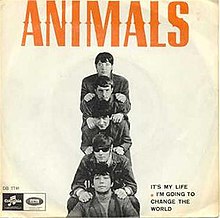It's My Life (Animals song)
| "It's My Life" | ||||
|---|---|---|---|---|
 |
||||
| Single by The Animals | ||||
| from the album The Best of The Animals | ||||
| B-side | "I'm Going to Change the World" (Non-album track) | |||
| Released | October 1965 | |||
| Format | 7" 45 RPM | |||
| Recorded | 1965 | |||
| Genre | Rock | |||
| Length | 3:09 | |||
| Label |
Columbia (UK) MGM (US) |
|||
| Songwriter(s) | Roger Atkins, Carl D'Errico | |||
| Producer(s) | Mickie Most | |||
| The Animals singles chronology | ||||
|
||||
Columbia (UK)
"It's My Life" is a song written by Brill Building songwriters Roger Atkins and Carl D'Errico. The song was originally performed by English R&B band The Animals, who released it as a single in October 1965 (see 1965 in music).
The song became a hit in several different countries and has since been recorded by multiple artists.
D'Errico, who wrote the music, and Atkins, who wrote the lyrics, were professional songwriters associated with the greater Brill Building scene in New York City. By 1965 they were working for Screen Gems Music, but had only found minor success at best.
"It's My Life" was written specifically for the Animals because their producer Mickie Most was soliciting material for the group's next recording sessions. (Other Animals hits to come out of this Brill Building call were "We Gotta Get Out of This Place" and "Don't Bring Me Down".). "It's My Life" has become D'Errico and Atkins' best-known work.
The Animals' recording is propelled by a bass guitar riff from Chas Chandler, soon joined by an electric twelve-string guitar riff from Hilton Valentine. In the view of musicologist Walter Everett, the doubled line gives the song its strength. The organ part by Dave Rowberry (Alan Price's replacement) gives the track the sound that distinguishes the Animals from other "British Invasion" groups, its darker timbre differing from Mike Smith of the Dave Clark Five, for example. Music writer Dave Marsh has compared the dual part to a rock version of pointillism. James E. Perrone feels the low-pitched, gruff vocal of lead singer Eric Burdon matches lyrics that rhetorically convey Burdon's working class origins in Tyneside, North East England:
...
Wikipedia
